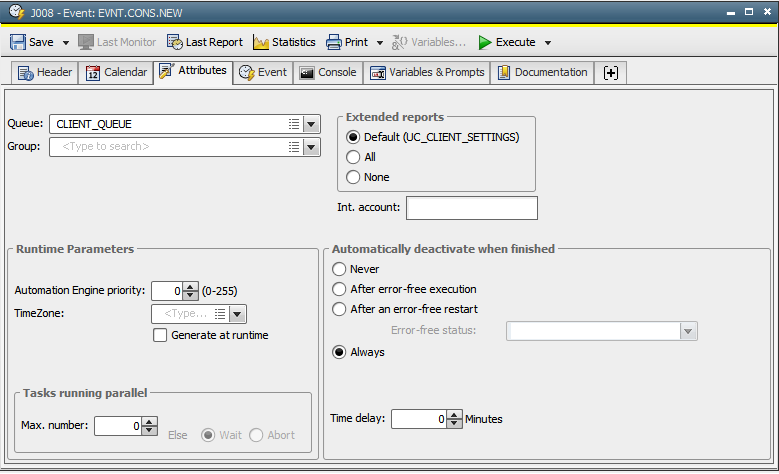
|
Calendar Tab |

Event |
Event Tab |

|
 Attributes Tab
Attributes TabThe Attributes tab is object type-specific and only available in "Event" objects.
It can be used to define start parameters.
Object: Event
Object class: Executable object
Object type
(short name): EVNT

|
Field/Control |
Description |
|---|---|
| Attributes | |
|
Group |
If the Event object should be started by a group, this group can be selected here. If there is no entry, the Event object is activated immediately. Note that the entry specified in here is not considered if the Event object is started through a Workflow object, a Schedule object or as a recurring task. |
| Queue | Selection of a Queue object in which the file transfer should be processed. The file transfer automatically starts in the Client Queue (object name: CLIENT_QUEUE) if nothing has been specified in this field. |
|
Int. Account |
Specification of an internal account Contents do not affect the AE system's internal processing. You can access the attribute "Int. Account" with script elements and integrate it in your processes. |
|
Parallel running tasks |
|
|
Max ... |
Setting that defines the maximum number of parallel executions for this Event object. Allowed values: 0 to 99999 Examples: Max. "1" - At any time, not more than one event execution must be available. |
|
Else: Wait Abort |
Instruction that defines how this Event object should be handled if the execution exceeds the specified maximum number of tasks that can run at the same time. Wait = The Event object waits until execution is possible. |
| Runtime Parameters | |
|
AE priority ... (0-255) |
Priority that should be used to executed this job in AE Allowed values: 0 to 255 The priority the administrator specified in the variable UC_CLIENT_SETTINGS (key "TASK_PRIORITY") is used if you select value "0". |
|
TimeZone |
TimeZone to be used |
|
Generate at runtime |
With this option being activated, the script is not executed at object activation but only when it starts. These can be two different points in time (for example, when the object is executed by a workflow). |
|
Deactivate autom. when finished |
The workflow's settings for automatic deactivation apply for event objects that are processed as part of this workflow. These settings overrule the settings of subordinate tasks. If the Activity Window includes many tasks that are not automatically or manually deactivated when they are finished, this can negatively affect performance and the Activity refresh cycle. |
|
Never |
The event is not automatically deactivated and remains visible in the Activity Window after it has been executed. |
|
After error-free execution |
The event is automatically deactivated after its successful execution. Interrupted file transfers remain visible in the Activity Window and must be deactivated manually. You can additionally specify a particular status for the error-free execution and a time delay for de-activation. Do so by using the fields Error-free status and/or Time delay ... Minutes. If this value is set also via the UC_CLIENT_SETTINGS, the setting in this field will be considered according to the following rules:
|
|
After an error-free restart |
The event is automatically deactivated after a successful restart. Previously interrupted scripts are also deactivated. You can additionally specify a particular status for the error-free execution and a time delay for de-activation. Do so by using the fields Error-free status and/or Time delay ... Minutes. If this value is set also via the UC_CLIENT_SETTINGS, the setting in this field will be considered according to the following rules:
|
|
Error-free status |
Status that confirms a successful event execution. If no status is selected, the system-return codes 1900 - 1999 (ANY_OK) represent error-free execution. |
|
Always |
The event is always automatically deactivated after it has been executed. Additionally, you can specify a time delay for a deactivation in the "Time delay" field. If this value is set also via the UC_CLIENT_SETTINGS, the setting in this field will be considered according to the following rules:
|
|
Time delay ... Minutes |
The event is automatically deactivated after a specified number of minutes. You can manually deactivate it before this time is over. The time difference only affects events, whose execution also resulted in an automatic deactivation. |